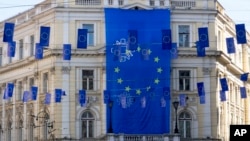The European Union agreed Thursday to open membership negotiations with Bosnia-Herzegovina but noted that the talks were conditional on more reforms being made in the Balkan nation.
"The European Council has just decided to open accession negotiations with Bosnia and Herzegovina," Charles Michel, president of the European Council, posted on X.
"Congratulations!" he added. "Your place is in our European family."
In 2022, Bosnia-Herzegovina was granted EU candidate status after years of stalled progress due to concerns over internal divisions and the nation’s fragile political structures.
EU leaders emphasized Bosnia-Herzegovina's requirement to accomplish various reforms, including economic, judicial and political changes, along with tackling corruption and money laundering.
The country, still scarred by ethnic tensions from the 1990s war that left 100,000 people dead and millions displaced, faces challenges from separatist leaders and the need to align with EU standards.
Milorad Dodik, a pro-Russia Bosnian Serb leader and president of Republika Srpska, is actively destabilizing Bosnia's political institutions, aiming to weaken the country until it falls apart, according to recent U.S. intelligence assessments. These revealed Dodik's efforts to challenge international oversight in Bosnia-Herzegovina and secure secession for his region. This poses a significant risk of heightened tensions with the Bosniak population and potential violent conflicts that could strain peacekeeping and reform necessary to satisfy the EU.
Bosnia-Herzegovina is just one of six nations in the Balkan region — including Albania, Serbia, Kosovo, Montenegro and North Macedonia — at different stages of the EU membership process. Following the onset of Russia’s war on Ukraine, EU officials are more motivated to pull the nations away from potential Russian influence.
German Chancellor Olaf Scholz said he was "very much for" moving a step forward "after the many efforts that have been made in Bosnia-Herzegovina."
"As a whole, the states of the Western Balkans also must be able to rely on us," he said. "The promise that they would be able to become members of the European Union was made … more than 20 years ago in Thessaloniki, and now we need the next steps."
Throughout Sarajevo, Bosnia-Herzegovina’s capital, citizens have expressed optimism about the decision by hanging EU flags.
Some information for this report came from The Associated Press, Agence France-Presse and Reuters.





